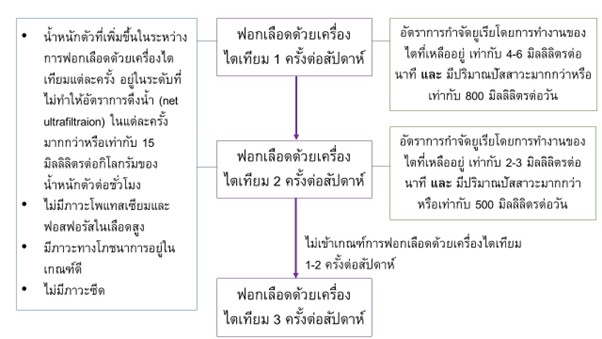Nutritional management in Incremental Hemodialysis Patients
Main Article Content
Abstract
In many countries including Thailand, thrice-weekly hemodialysis has been routinely prescribed in end stage kidney disease patients initiating hemodialysis regardless of their residual kidney function. This prescription was based on randomized controlled trials assessing urea clearance in patients who had little or no residual kidney function. However, some incident hemodialysis patients still have significant residual kidney function which will decline rapidly after thrice-weekly hemodialysis. This might lead to long-term unfavorable outcomes including increased mortality. From the current evidence, measures to preserve the residual kidney function include regular monitoring of the residual kidney function, avoidance or minimizing nephrotoxic agents, blood pressure control, avoidance of intradialytic hypotension, using of high-flux biocompatible dialyzer, and using ultrapure dialysate. Less frequent hemodialysis is also considered as a possible measure and there is an emerging concept of incremental hemodialysis, that is to start hemodialysis with less frequent manner in patients with adequate residual kidney function, and to increase hemodialysis frequency when the residual kidney function decline to the point of inadequate solute clearance. This dialysis regimen should be applied along with the limitation of dietary protein intake to reduce uremic toxin generation as well as the restriction of dietary sodium and fluid to reduce interdialytic weight gain. According to the current evidence, patients who initiate once-weekly dialysis should limit their dietary protein intake to 0.6 grams per kilogram of body weight per day in non-dialysis day and liberate their protein intake in the dialysis day. For those receiving twice-weekly or thrice-weekly hemodialysis, dietary protein intake should be 1.0-1.2 grams per kilogram of body weight per day for both dialysis and non-dialysis days.
Article Details

This work is licensed under a Creative Commons Attribution-NonCommercial-NoDerivatives 4.0 International License.
This article is published under CC BY-NC-ND 4.0 license, which allows for non-commercial reuse of the published paper as long as the published paper is fully attributed. Anyone can share (copy and redistribute) the material in any medium or format without having to ask permission from the author or the Nephrology Society of Thailand.
References
Lowrie EG, Laird NM, Parker TF, Sargent JA. Effect of the hemodialysis prescription of patient morbidity: report from the National Cooperative Dialysis Study. N Engl J Med. 1981;305:1176-81.
Eknoyan G, Beck GJ, Cheung AK, Daugirdas JT, Greene T, Kusek JW, et al. Effect of dialysis dose and membrane flux in maintenance hemodialysis. N Engl J Med. 2002;347:2010-9.
Murea M, Moossavi S, Garneata L, Kalantar-zadeh K. Narrative Review of Incremental Hemodialysis. Kidney Int Rep. 2019;5:135-48.
Kalantar-Zadeh K, Unruh M, Zager PG, Kovesdy CP, Bargman JM, Chen J, et al. Twice-weekly and incremental hemodialysis treatment for initiation of kidney replacement therapy. Am J Kidney Dis. 2014;64:181-6.
Chertow GM, Levin NW, Beck GJ, Depner TA, Eggers PW, Gassman JJ, et al. In-center hemodialysis six times per week versus three times per week. N Engl J Med. 2010;363:2287-300.
Locatelli F, Vecchio LD, Aicardi V. Nutritional Issues with Incremental Dialysis: The Role of Low-Protein Diets. Semin Dial. 2017;30:246-50.
Mathew AT, Obi Y, Rhee CM, Chou JA, Kalantar-Zadeh K. Incremental dialysis for preserving residual kidney function-Does one size fit all when initiating dialysis?. Semin Dial. 2018;31:343-52.
Toth-Manikowski SM, Sirich TL, Meyer TW, Hostetter TH, Hwang S, Plummer NS, et al. Contribution of 'clinically negligible' residual kidney function to clearance of uremic solutes. Nephrol Dial Transplant. 2020;35:846-53.
Obi Y, Rhee CM, Mathew AT, Shah G, Sterja E, Brunelli SM, et al. Residual Kidney Function Decline and Mortality in Incident Hemodialysis Patients. J Am Soc Nephrol. 2016;27:3758-68.
Mathew AT, Fishbane S, Obi Y, Kalantar-Zadeh K. Preservation of residual kidney function in hemodialysis patients: reviving an old concept. Kidney Int. 2016;90:262-71.
Xydakis D, Papadogiannakis A, Sfakianaki M, Kostakis K, Stylianou K, Petrakis I, et al. Residual renal function in hemodialysis patients: the role of angiotensin-converting enzyme inhibitor in its preservation. ISRN Nephrol. 2012;2013:184527.
Hemodialysis Adequacy 2006 Work Group. Clinical practice guidelines for hemodialysis adequacy, update 2006. Am J Kidney Dis. 2006;48:S2–S90.
Schiffl H, Lang SM, Fischer R. Ultrapure dialysis fluid slows loss of residual renal function in new dialysis patients. Nephrol Dial Transplant. 2002;17:1814-8.
Liu Y, Zou W, Wu J, Liu L, He Q. Comparison between incremental and thrice-weekly haemodialysis: Systematic review and meta-analysis. Nephrology (Carlton). 2019;24:438-44.
Daugirdas JT, Greene T, Rocco MV, Kaysen GA, Depner TA, Levin NW, et al. Effect of frequent hemodialysis on residual kidney function. Kidney Int. 2013;83:949-58.
Zhang M, Wang M, Li H, Yu P, Yuan L, Hao C, et al. Association of initial twice-weekly hemodialysis treatment with preservation of residual kidney function in ESRD patients. Am J Nephrol. 2014;40:140-50.
Obi Y, Streja E, Rhee CM, Ravel V, Amin AN, Cupisti A, et al. Incremental Hemodialysis, Residual Kidney Function, and Mortality Risk in Incident Dialysis Patients: A Cohort Study. Am J Kidney Dis. 2016;68:256-65.
Bolasco P, Cupisti A, Locatelli F, Caria S, Kalantar-Zadeh K. Dietary Management of Incremental Transition to Dialysis Therapy: Once-Weekly Hemodialysis Combined With Low-Protein Diet. J Ren Nutr. 2016;26:352-9.
Morelli E, Baldi R, Barsotti G, Ciardella F, Cupisti A, Dani L, et al. Combined therapy for selected chronic uremic patients: infrequent hemodialysis and nutritional management. Nephron. 1987;47:161-6.
Locatelli F, Andrulli S, Pontoriero G, Filippo SD, Bigi MC. Supplemented low-protein diet and once-weekly hemodialysis. Am J Kidney Dis. 1994;24:192-204.
Caria S, Cupisti A, Sau G, Bolasco P. The incremental treatment of ESRD: a low-protein diet combined with weekly hemodialysis may be beneficial for selected patients. BMC Nephrol. 2014;15:172.


